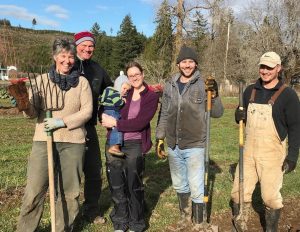Skokomish Valley Farm
The first time all 18 new owners of Skokomish Valley Farms got together, they discovered that none of them had ever lived or even worked on a farm. The structure of the farm was also new: each of the 18 owned a 40-acre parcel in what had once been a family farm in Shelton. What they had in common was a strong desire to be involved in producing food in a way that regenerates the land, sustains the people who depend on it and remains financially viable for future generations.

That was about 10 years ago. Now the farm has four enterprise activities: vegetables, chickens, hay and an orchard. In addition to a fully-subscribed CSA, they deliver to farmers’ markets in Bremerton, Olympia, Shelton and Union. They’re also part of South Sound Fresh, which began as a way to link local farmers with local chefs.
To meet the strictures of the pandemic, this year they turned South Sound Fresh into an on-line food market that now delivers to households in Mason County and parts of Olympia. That “food hub” element has taken off, with dozens of participating farms and producers offering a whole raft of things—fresh vegetables of course, but baked goods, preserved foods, dairy, chicken and beef, fish and more. The number of orders has grown to 75 each week (see contact information at the end of the article).
Farm manager Paul Miller explained the structure of the farm. All of the owners purchased their parcels separately. On each parcel, there is a five-acre homesite with the majority of the remainder of each parcel in an agricultural easement held by the Owners’ Association. A Board of Directors appoints a manager for each of the four enterprises, authorizes a budget and sets overall policies. The farmed acreage is operated as a whole—the chickens, for example, hang out with the vegetables.
Sustainability, preservation, restoration and conservation are key components of how they manage the farm. Over seventy acres are in a Conservation Reserve Enhancement Program easement to preserve and restore riparian areas along the Skokomish River. They also have more than 30 acres in an Emergency Watershed Protection program to protect wetland areas in perpetuity.
Each farm owner decides on the role they will play on the farm. Five families live and work there full time. Some are “kind of homesteaders” and others come and work part time. A few live elsewhere and haven’t actually been to the farm. Miller pointed out that the “community around a farm” with its cooperative use of land offers a model with multiple advantages including land accessibility, capital for startup, generational transition, varied experience and expertise, support from multiple owners among other things.
It turns out that it’s possible to learn to be a farmer—for the aspiring farmers at Skokomish Valley it meant reading a lot of books, going to conferences, talking to other area farmers and checking in with the Mason Conservation District and WSU Extension. They are organically certified by WSDA and are working with the Mason CD on other conservation and farming practices.
There is work to do on the farm year-round. Right now, along with three employees, the vegetable harvest is mostly coming to an end —they’re finishing up the greens, high tunnels and storage crops— then it will be time to plant again.
Both Paul Miller and his wife Andrea had careers in the military and with their children had moved all over the world for many years. Along with the others, they were looking for a more connected way of life. Paul said, “Some people thought we were crazy to leave steady jobs, build our own house and live on the farm. We built a small cabin while we were still in the airforce. But we love it here. And the others love it as well.”
The Skokomish Valley Farm offers those connections—to the land, to a community, to meaningful work, to the future. The Miller children, who range in age from 11 to 17, are home schooled—as they had been during their mobile lives with the military. There are on-line courses, classes in the community and a community choir to participate in. During the pandemic, sports activities were curtailed but on a farm, there is plenty to do out of doors.
Often on a holiday, there will be a get-together, or a party for a kids’ birthday—the youngest child on the farm is one year old. There is a community area in a grove of trees, with a wood-fired pizza oven. There’s a pond.
Three miles up a gravel road, another road leads to this special arrangement at the foot of the Olympic Mountains, where a small group of people are creating a farm that could be part of their lives for generations.
Sources for this article are the Community Farm Land trust and a conversation with Paul Miller, SVF farm manager. To contact SVF or find out more about the Food Hub, go to www.skokomishvalleyfarms.com or email farmer@skokomishvalleyfarms.com
The Community Farm Land Trust is a local nonprofit that brings the community together to preserve working farmland forever. The CFLT keeps working farmland affordable and accessible for the next generation of farmers in the South Sound. The CFLT also provides education outreach and supports the local farm economy with the annual publication of the South Sound Farm Map.
Be First to Comment